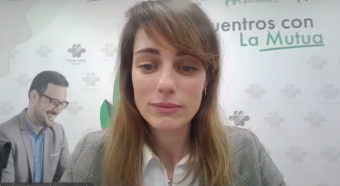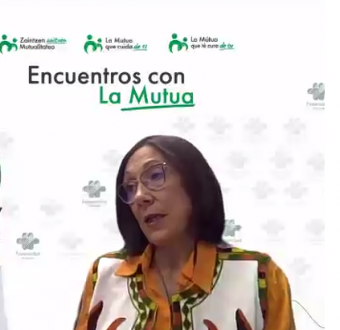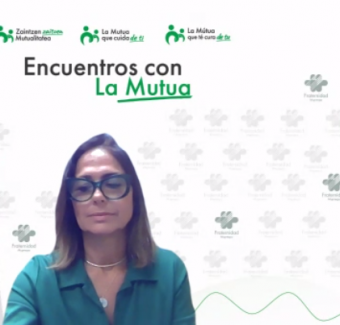
New webinar 'Meetings with the Mutua' focused on posted workers and TA abroad
Fraternidad-Muprespa held its second webinar this Thursday “Meetings with the Mutua”, a space for dissemination and knowledge taught by experts from the Mutua in various fields. Silvia Vela, director of the Department of Communication and Institutional Relations of the Mutua, presented the day and its speakers to the more than 600 attendees, Alejandra Alonso de Castañeda, head of the Area of Professional Contingency of the Department of Economic Benefits of Fraternidad-Muprespa, and doctor Eva Manzano, director of the Department of Health Management of the Mutual.
Alonso de Castañeda intervened first to focus on the legal requirements that affect workers who carry out their activity abroad of Spain on a temporary basis, highlighting four large blocks: temporality, personal, business and administrative conditions.
“ These postings must have a limited duration, the worker cannot be sent to replace another except in exceptions and must be linked to the Spanish Social Security without the same person being able to be posted again to the same country until after a minimum period ”, he explained. It is also mandatory to comply with the country's administrative requirements.
The day reviewed the different scenarios depending on the destination: countries of the European Union and the European Economic Area, states with bilateral or multilateral agreements, and those without a current agreement. In any case, it is necessary to complete the TA300 displacement communication form. Special emphasis was placed on the fact that “not all expenses derived from receiving healthcare are reimbursable, given that some healthcare systems contemplate co-payments,” he said.
Special mention deserved the teleworking situation. Alonso de Castañeda cited the key regulatory instruments that regulate this type of work and that both recognize that work can be done from anywhere, if they maintain contact with the employer through technology.
For workers displaced to countries that are signatories of the Multilateral Ibero-American Social Security agreement (Argentina, Brazil, Chile, Colombia, Ecuador, Peru, Portugal and Uruguay), the IBERO model must be added to the TA300 form, and the General Treasury of Social Security will issue the official document that certifies the displacement.
Given that alongside the multilateral agreement there are bilateral agreements with some of these countries, it was explained that the provision that is most favorable to them should be applied to the worker. In addition, it was clarified that this agreement does not contemplate health care, so the convenience of evaluating alternatives for medical coverage was reiterated.
Finally, for trips to countries without a Social Security agreement with Spain, the registration status is assimilated to guarantee social protection, provided that certain actions are carried out by the company and the worker.
The conference highlighted the importance of knowing these alternatives in contexts without international coverage, and it was recommended that companies plan these trips in advance and in detail.
Health care abroad
The development of this this other central aspect of the day was carried out by Dr. Eva Manzano, who reported that when you suffer a work accident abroad jero “ you must go to the public service, present the corresponding document and report the incident to the mutual insurance company that will appoint a ‘correspondent’ ”.
The function of this professional is to gather information about the care needs of the injured person, with a view to possible repatriation, a procedure whose expenses are borne by the mutual insurance company, as long as there is a medical prescription and the clinical situation allows it.
With this conference, Fraternidad-Muprespa reinforced its commitment to offering clear and practical information to companies, consultancies and workers, highlighting the importance of carrying out the appropriate procedures for correct administrative management in the event of a possible contingency.



